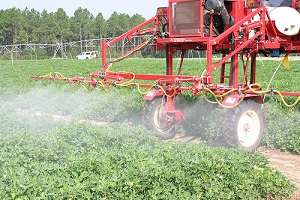Moving beyond agricultural pesticides

The smart use of fertilisers could help reduce global dependence on pesticides in agriculture, and slow the trend of pests developing resistance to the chemicals meant to control them, new research suggests.
Researchers at UWA's Institute of Agriculture and School of Animal Biology say developing new pesticides has become too expensive, with companies forced to undertake extensive health and environmental testing.
An aging workforce in the agriculture sector combined with increased labour costs and larger farms means not only are there less chemicals available, but the ways they are applied are also becoming less efficient.
Lead researcher Associate Professor Christian Nansen says his team is looking at ways to stem the reliance on pesticides by enabling farmers to manipulate the likelihood of where pests will be.
"That's where the smart use of fertilisers comes in. We want to demonstrate how we can use fertilisers to create parts of the paddock more likely to be susceptible to pests so we know where to look for them," A/Prof Nansen says.
"Crops become highly susceptible to pests when they are under stress, and can be used as a tool to prevent pests becoming a problem in certain sections of the field.
"If we don't find them in the places where they are most likely to be, then we don't need to go any further. If they are found, we spray and ensure we get good coverage of the area before they spread to the rest of the crop.
"We want to maintain the high performance of the available pecticides. So we only use them when we absolutely have to."
The team conducted choice experiments where winged aphids were allowed to choose between canola plants grown on different fertiliser regimes.
Researchers say they observed a clear preference for plants that had less fertliser, particularly potassium.
"If we gave them too much or too little potassium, those plants were preferred over the ones that had a medium range potassium.
"And this is very interesting here in WA, where we have large areas of potassium deficient soils. It's already a part of WA growers' strategy to apply further potassium. But they had maybe not thought of it as part of that pest management strategy," A/Prof Nansen says.
A/Prof Nansen says they've received interest from grower groups to expand research.
"It is still at experimental plot and lab stage, but there is plenty of literature out there supporting this innovative approach to insect pest management."
Provided by Science Network WA












.jpg)




